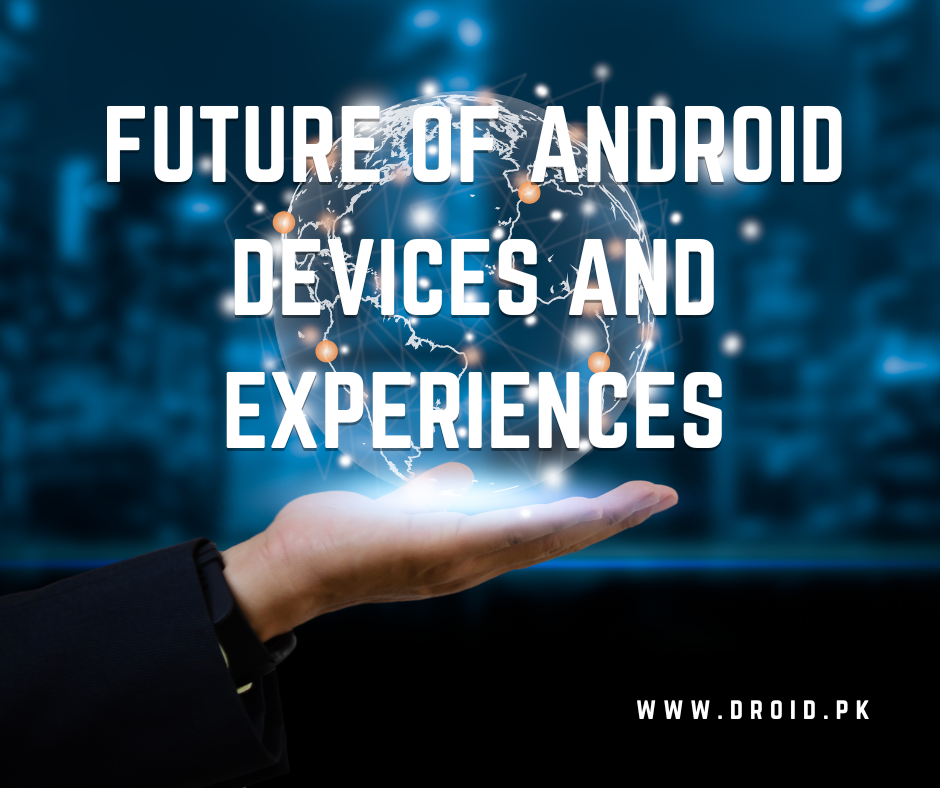
Predictions for the Future of Android Devices and Experiences
Share

The world of Android devices is constantly evolving, bringing new innovations and experiences to users worldwide. As technology advances, it's fascinating to envision the future of Android devices and the possibilities they hold. In this article, we will explore some predictions for the future of Android devices and experiences, ranging from enhanced user interactions to seamless connectivity with the Internet of Things (IoT).
Introduction
Android has come a long way since its inception, transforming from a mobile operating system to a diverse ecosystem of devices and experiences. As we look ahead, several exciting developments are on the horizon, promising to redefine the way we interact with Android devices.
Evolution of Android Devices
From Smartphones to a Diverse Ecosystem
Android started its journey as an operating system for smartphones, but it has now expanded into a comprehensive ecosystem that includes tablets, smartwatches, smart TVs, and even connected cars. In the future, this trend will continue, with Android devices becoming more varied and tailored to specific use cases.
Integration of AI and Machine Learning
Artificial intelligence (AI) and machine learning (ML) technologies have already made their mark on Android devices, enabling features like smart assistants, intelligent camera systems, and personalized recommendations. In the future, AI and ML will play an even more significant role, enhancing device capabilities and delivering seamless user experiences.
Enhanced User Experiences
Advancements in Display Technology
Display technology is poised for significant advancements in the future of Android devices. We can expect to see the widespread adoption of flexible and foldable displays, offering users a versatile and immersive viewing experience. These displays will allow for innovative form factors, enabling devices that seamlessly transition between phone and tablet modes.
Immersive Augmented Reality (AR) and Virtual Reality (VR)
The future of Android devices will bring us closer to immersive AR and VR experiences. With the integration of powerful processors, high-resolution displays, and advanced sensors, Android devices will provide users with seamless access to virtual worlds and interactive augmented reality overlays. From gaming to education and productivity, AR and VR will revolutionize how we interact with technology.
Smarter and More Contextual AI
Personalized Recommendations and Predictive Capabilities
Android's AI capabilities will become increasingly sophisticated, offering users highly personalized recommendations and predictive features. AI algorithms will analyze user behavior, preferences, and contextual information to anticipate their needs and provide tailored suggestions for apps, content, and services.
Natural Language Processing and Voice Assistants
Voice assistants will continue to evolve, becoming smarter and more conversational. Natural language processing (NLP) technologies will enable voice assistants to understand complex queries, follow up with contextual questions, and provide more natural and human-like responses. Voice assistants will become indispensable in everyday tasks, ranging from managing appointments to controlling smart home devices.
Connectivity and Internet of Things (IoT)
Seamless Integration with IoT Devices
Android devices will serve as the central hub for seamless integration with IoT devices, bringing together various smart home appliances, wearable gadgets, and connected vehicles. Users will have the convenience of controlling and monitoring their IoT ecosystem through a unified Android interface, simplifying their daily lives and enhancing overall efficiency.
Expanded Smart Home and Automation Capabilities
Android's role in the development of smart homes will expand further, allowing users to automate and control various aspects of their living spaces. From intelligent lighting and energy management to home security systems and appliances, Android devices will offer enhanced compatibility and interoperability with a wide range of IoT devices.
Security and Privacy
Biometric Authentication and Advanced Encryption
As the importance of security and privacy grows, Android devices will continue to prioritize robust security measures. Biometric authentication methods such as fingerprint recognition, facial recognition, and iris scanning will become more prevalent, providing users with secure and convenient ways to unlock their devices and authenticate transactions. Advanced encryption techniques will safeguard user data and communications, ensuring confidentiality and integrity.
Enhanced Privacy Controls and Data Protection
Android devices will offer users more granular control over their privacy settings, allowing them to choose which apps have access to specific permissions and personal information. Users will have increased transparency and control over data collection and sharing, empowering them to protect their privacy in an increasingly connected world.
The future of Android devices holds great promise and excitement. With advancements in display technology, immersive AR and VR experiences, smarter AI capabilities, seamless integration with IoT devices, and enhanced security and privacy measures, Android devices will continue to revolutionize the way we interact with technology. As we embrace this future, Android will play a central role in shaping our digital experiences and enhancing our everyday lives.
FAQs
-
Will foldable devices become mainstream in the future? Foldable devices have the potential to become mainstream in the future, as they offer versatility and a unique user experience. As technology advances and manufacturing costs decrease, foldable devices are likely to gain wider adoption.
-
How will Android adapt to advancements in 5G technology? Android devices will leverage the capabilities of 5G technology to deliver faster download and upload speeds, lower latency, and enhanced network reliability. This will enable seamless streaming, real-time communication, and support for bandwidth-intensive applications.
-
Can we expect improvements in battery life for Android devices? Battery life improvements will remain a focus for Android device manufacturers. Advancements in battery technology and optimizations in software and hardware will help extend battery life and enhance overall device efficiency.
-
What role will Android play in the development of smart cities? Android will play a vital role in the development of smart cities by serving as a platform for managing and integrating various IoT devices and services. Android-powered devices will enable smart city infrastructure management, environmental monitoring, transportation systems, and citizen engagement.
-
Will Android devices replace traditional PCs and laptops? While Android devices offer powerful capabilities, they may not completely replace traditional PCs and laptops. However, Android's versatility and mobility make it a strong contender for certain use cases, especially in the context of productivity on the go and media consumption.
